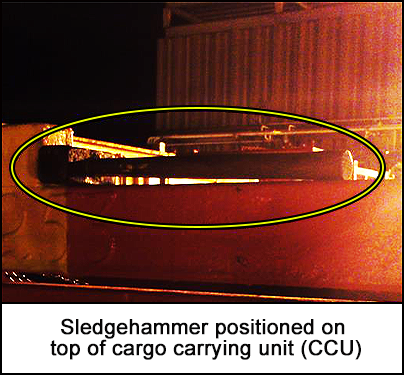-
What happened?
Workers were preparing to load water-based mud while their vessel was in port.
They were connecting the bulk hose when they noticed an object inside it.
They borrowed a sledgehammer to remove the object.
After the hose had been connected, the sledgehammer was placed onto a cargo carrying unit (CCU) and was not removed before the unit was tranferred to the offshore platform.
A flagman on the platform noticed the sledgehammer lying loose on top of the CCU when receiving baskets and containers from the vessel.
The sledgehammer was considered a potential dropped object. It weighed 2.2kg/5lbs and at a possible drop height of 60m/195ft, the impact would have been of 1318J.
No damage was caused.

-
Why did it happen?
After connecting the hose, the worker placed the sledgehammer on top of the CCU instead of returning it to vessel crew.
Vessel crew did not see the sledgehammer before the CCU was sent to platform.

-
What did they learn?
Establish routines for checking cargo for loose objects.
- Ensure crews are aware of their responsibilities (e.g. deck crew and bridge crew).
Ensure checking for loose objects requirement is covered in the toolbox talks before loading/discharging operations.
Ensure ship-specific risk assessment includes the check of cargo for loose objects.

-
Ask yourself or your crew
Have you ever noticed a piece of equipment left behind? What did you do?
What site checks do you carry out before you complete your work?
How do we check for loose objects before loading/discharging operations?
- Do we have a procedure in place for this? If not, should we?
Who is responsible for identifying loose objects before/after today’s activities?

Add to homescreen
Content name
Select existing category:
Content name
New collection
Edit collection
What happened?
Workers were preparing to load water-based mud while their vessel was in port.
They were connecting the bulk hose when they noticed an object inside it.
They borrowed a sledgehammer to remove the object.
After the hose had been connected, the sledgehammer was placed onto a cargo carrying unit (CCU) and was not removed before the unit was tranferred to the offshore platform.
A flagman on the platform noticed the sledgehammer lying loose on top of the CCU when receiving baskets and containers from the vessel.
The sledgehammer was considered a potential dropped object. It weighed 2.2kg/5lbs and at a possible drop height of 60m/195ft, the impact would have been of 1318J.
No damage was caused.

Why did it happen?
After connecting the hose, the worker placed the sledgehammer on top of the CCU instead of returning it to vessel crew.
Vessel crew did not see the sledgehammer before the CCU was sent to platform.
What did they learn?
Establish routines for checking cargo for loose objects.
- Ensure crews are aware of their responsibilities (e.g. deck crew and bridge crew).
Ensure checking for loose objects requirement is covered in the toolbox talks before loading/discharging operations.
Ensure ship-specific risk assessment includes the check of cargo for loose objects.
Ask yourself or your crew
Have you ever noticed a piece of equipment left behind? What did you do?
What site checks do you carry out before you complete your work?
How do we check for loose objects before loading/discharging operations?
- Do we have a procedure in place for this? If not, should we?
Who is responsible for identifying loose objects before/after today’s activities?
A 2.2kg/5lbs sledgehammer was left on top of a cargo carrying unit (CCU) after being used for an activity while the vessel was still in port. The sledgehammer was not removed by vessel crew before leaving port. It was noticed by the flagman on the offshore platform when receiving baskets and containers from the vessel.













